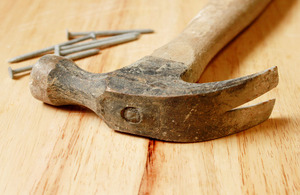£180 million to help vulnerable stay in their homes
Housing Minister Mark Prisk announces that councils across England will receive a share of the £180 million Disabled Facilities Grant.

Housing Minister Mark Prisk today (28 March, 2013) confirmed £180 million to help councils fund the adaptations disabled people need to live independently in their own home.
Councils across England will receive a share of the £180 million Disabled Facilities Grant, which provides financial help to install a wide range of housing adaptations or modifications such as wider doorways, stair lifts and level access showers.
Mr Prisk said that the grant was essential to help thousands of people stay in their homes if their circumstances change, providing the support that disabled or vulnerable people need to live independently and comfortably, whether they are homeowners, social tenants or living in rented accommodation.
Ministers have protected the Disabled Facilities Grant programme for the last 3 years, with a further £185 million expected in next year’s funding.
Housing Minister Mark Prisk said:
“For many people, the security of being able to stay in your own home in difficult times can have a real impact on their health and wellbeing.
“That’s why we’ve protected the Disabled Facilities Grant. The £180 million I’ve allocated today will help to support people across the country through disability and provide some of our most vulnerable with the help they need to live independently for as long as possible.”
Further information
A table showing Disabled Facilities Grant allocations for each local authority can be found in the Disabled Facilities Capital Grant determination 2013 to 2014.
Any eligible disabled person can apply for this grant through their local authority, whether they are a homeowner, private tenant or local authority tenant. The council will arrange for an occupational therapist through social services to visit the home to assess which adaptations are needed.
The grant can be used for adaptations that provide better freedom of movement into and around the home or to provide essential facilities. An occupational therapist will look at individual circumstances and recommend the type of adaptation(s) needed.
Acceptable types of work include:
- widening doors and installing ramps
- providing or improving access to rooms and facilities - for example, by installing a stair lift or providing a downstairs bathroom
- adapting heating or lighting controls to make them easier to use
- improving or providing a suitable heating system
- providing suitable bathroom or kitchen facilities
- improving access to and movement around the home to enable individual to care for another person who lives in the property, such as a child